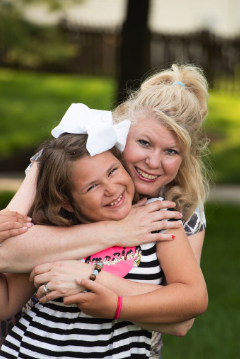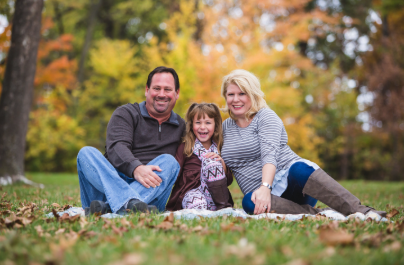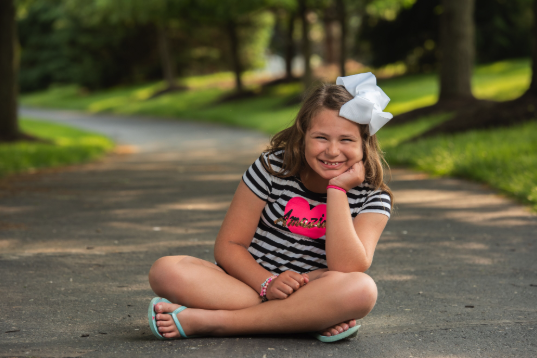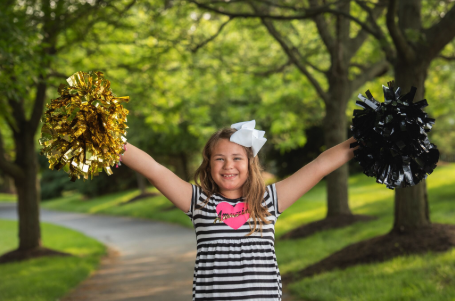Fishers Girl Is Dancing Again After 7 Surgeries & 4-Year Battle With Rare Kidney Disease
Photographer: Amy Payne
 Imagine four years of your childhood spent at hospitals and doctors’ offices, missing out on school, playing with your friends and doing all the fun things your friends are doing. Now imagine getting progressively sicker as you wait for doctors to determine a diagnosis. That was the reality for one brave, little nine-year-old Lydia Check of Fishers. Though, to call her brave would be an extreme understatement.
Imagine four years of your childhood spent at hospitals and doctors’ offices, missing out on school, playing with your friends and doing all the fun things your friends are doing. Now imagine getting progressively sicker as you wait for doctors to determine a diagnosis. That was the reality for one brave, little nine-year-old Lydia Check of Fishers. Though, to call her brave would be an extreme understatement.
Lydia’s journey began in 2014 at age four. That summer she became sick, tired and weak. Visits to the family doctor failed to produce answers. By winter, her weight loss was so severe, it became clear to her parents that they needed to seek the help of specialists.
A visit to the gastroenterologist in early 2015 produced a diagnosis of ulcerative colitis, because of evidence of bleeding ulcers in her stomach and colon. By fall 2015, monthly blood tests had revealed there was a deeper issue causing Lydia’s illness. Doctors suspected kidney disease, and a Labor Day weekend stay at Riley gave the family the answers they needed.
After a biopsy surgery, Lydia was officially diagnosed with nephronophthisis, a genetic kidney disease leading to renal failure. The disease meant irreversible scarring and damage to the kidneys, and the only solution would be a kidney transplant.
“It was such a relief to have a diagnosis,” says Paula Check, Lydia’s mom, “But, we knew we had a long road ahead of us.”
While Lydia’s parents fought through the red tape of getting insurance approval for the transplant, doctors addressed the urgent issue of dehydration and medication by placing a GI tube directly to her stomach to deliver critical fluids and medications. Finally, in 2017, Lydia’s insurance approved her for placement on the national transplant list.
During that time, Lydia did her best to carry on as any other second-grader would. She went to school as much as she could and usually missed only one day of school a week. Lydia wanted to play on the playground like her other classmates, but it was difficult.
“My friends were afraid I was too sick to play,” she says. “And I was a little afraid to play on some of the equipment because I might get hurt.”
 The Checks got a call in November that a kidney had been found for Lydia. Unfortunately, she developed a fever along with vomiting, signaling that her immune system was too weak to withstand the transplant surgery.
The Checks got a call in November that a kidney had been found for Lydia. Unfortunately, she developed a fever along with vomiting, signaling that her immune system was too weak to withstand the transplant surgery.
The summer of 2018 presented more challenges. Lydia became weaker. At the end of the summer, her labs revealed that she needed to be admitted to the hospital overnight for medications. Doctors advised the Checks that Lydia would need to start dialysis. What should’ve been a routine process got complicated. Lydia underwent surgery to insert a Hemo Dialysis port. The surgery caused her to lose a lot of blood, and she needed a blood transfusion. Then, after a couple of days, doctors discovered a problem with her central line, requiring yet another surgery to remove it and replace it with a new one. With that, Lydia began dialysis three days a week for four hours and proceeded to start third grade.
Four years into the journey, the Check’s finally got the miracle they were praying for. They had just returned home from dialysis, and Riley Children’s Hospital called with the news that a kidney match had been found. On September 1, 2018, Lydia underwent successful kidney transplant surgery.
“When we got the news, we felt every emotion,” Paula says. “We laughed, we cried, and we were scared.”
An eight-and-one-half-year-old Lydia, so young to process the reality of what was about to happen, tried to be strong.
“It still makes me sad that someone lost their life and I can live,” Lydia says. “But when I was the saddest and scared, I tried to make myself feel better by listening to my favorite songs by Taylor Swift and wrap up with my favorite pinkie blanket.”
Two weeks after the transplant, Lydia returned home to a house full of get-well greetings from friends. In-person visits from friends were too risky because of her weakened immune system, but frequent phone calls and FaceTime calls continued to brighten her days. Lydia had the help of two schoolteachers who visited to help her keep up with schoolwork.
“We tried to keep things at home as normal of a routine as possible,” Paula says.
 The norm to the family meant Paula not being able to remain on full-time status at work so that she could have the flexibility to be home with Lydia as needed. She and Lydia’s dad, David, often traded days to take off work.
The norm to the family meant Paula not being able to remain on full-time status at work so that she could have the flexibility to be home with Lydia as needed. She and Lydia’s dad, David, often traded days to take off work.
In all, Lydia endured seven surgeries before embarking on the road to recovery. She returned full-time to school in January 2019 and returned to dancing at her favorite dance studio where she’d attended since age four. Now, at nine years old, Lydia was eligible to join the hip-hop class. The class was already eight weeks into rehearsals for the spring recital, but Lydia joined them and caught up quickly.
“She was delighted to be able to participate in the recital in May,” Paula says.
Though Lydia’s recovery is mostly complete now, she still has a bit to go before hitting that milestone one-year mark in September. She continues to receive the overnight hydration through the tube, she gets her labs drawn every other week and has outpatient hospital visits every other month to assess her kidney function. She’s still restricted from playing contact sports and has to avoid grapefruit, star fruit and pomegranate due to the interference with the anti-rejection medication. At the one-year mark, they’re hoping the overnight hydration can stop and the G-tube can be removed. Paula is also hoping to resume her full-time work status after the one-year milestone.
The Check family isn’t just looking forward to the one-year milestone, they’re waiting to hear some very exciting news.
“We’re hoping to be approved for a Make a Wish trip to Paris or to meet Lydia’s idol, Taylor Swift,” Paula says.
As soon as Lydia completes her essay, they’ll submit the paperwork. The family is unsure how soon they would find out if Lydia’s wish is approved.
With the bulk of the challenges behind them, the Checks are trying to focus on being grateful for the things that helped them get through the tough times.
“We can’t say enough about the staff at Riley Children’s Hospital,” Paula says. “All of their support, as well as their program for Lydia to receive get-well cards and wishes, got us through those rough days. We relied on a lot of prayer, music, meditation and lots of advice from others on how to cope.”
Lydia paid it forward by being a mentor to another Riley child with kidney disease.
“She helped him get through his struggles and now he’s doing much better,” Paula says.
Lydia hopes to become involved with mentoring other Riley Kids by sharing her experience.





